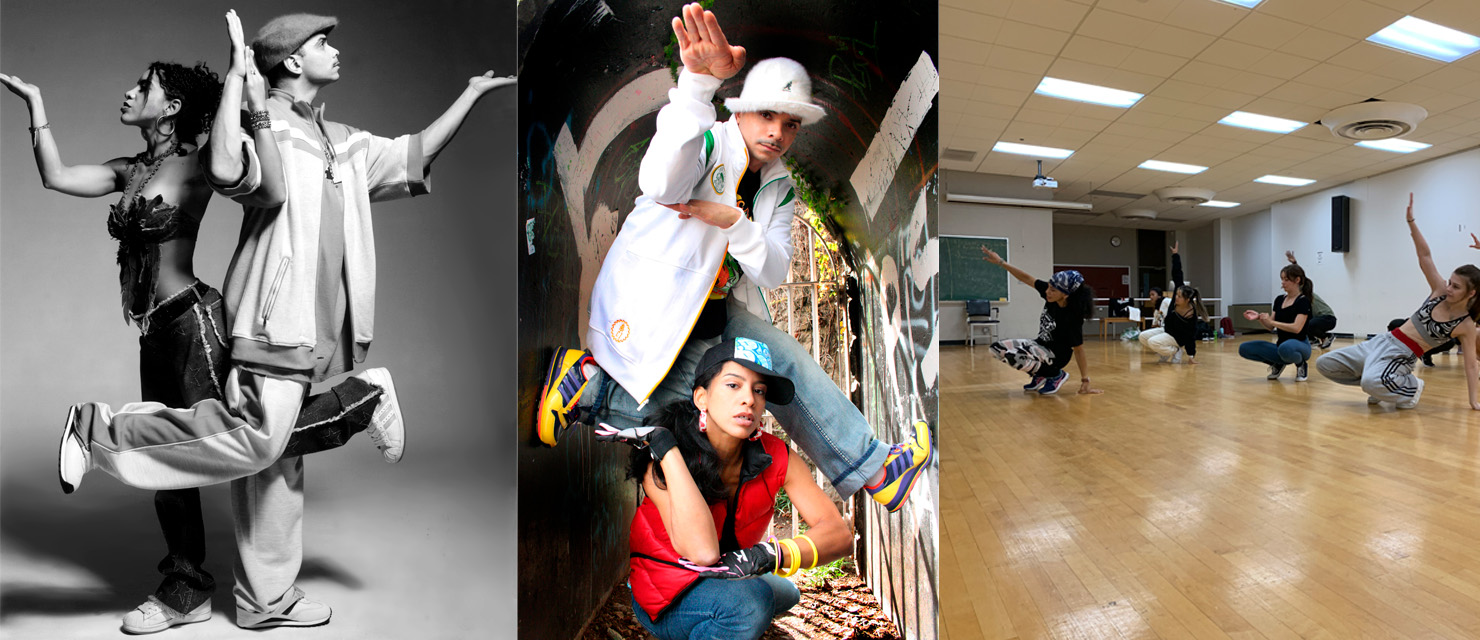How Husband-and-Wife Duo Kwikstep and Rokafella Are Celebrating Hip Hop’s 50th Anniversary
It’s impossible to chart the rise of hip hop without coming across Ana “Rokafella” Garcia and Gabriel “Kwikstep” Dionisio. Along with their break-dance theater company, Full Circle Souljahs, they have dedicated their careers to uplifting New York City’s breaking community, challenging the genre’s boundaries, and calling attention to its forebears. This month, the husband-and-wife duo will curate an all-styles dance battle at Lincoln Center and premiere a newly commissioned duet at Jacob’s Pillow, part of the celebrations marking the 50th anniversary of the storied Bronx block party where hip hop was born.
What does celebrating the 50th anniversary of hip hop mean to you?
Kwikstep: It’s great that everybody’s coming together to celebrate a movement that’s so young but has already made a global impact. I look at this 50th anniversary as a reset, because hip-hop culture has been saturated with pop culture and consumerism. But true hip-hop culture comes from the people before anything else, and from the four basic elements: the deejay, the break dancer, the graffiti artist, and the emcee.
You’re involved in several events centering on the anniversary this year. Tell us about the dance battle you’re planning at Lincoln Center.
Rokafella: On August 9th, we’ll be hosting an all-styles dance battle with a deejay and eight top competitors. We’re kicking off the event by screening bits of the newly released oral histories of street and club dance masters from the New York Public Library’s dance division. We’ll have some of the dance masters there so they can answer questions. We hope audiences walk away understanding that these are people whose unique trajectories helped to inform what street and
hip-hop dance is.
Kwikstep: For Afro-diasporic people, word of mouth is key to passing along our history. We’re trying to get all of hip hop’s pioneers into the catalogs as soon as possible. Their interviewers come from the same neighborhoods, so we can capture their lingo and body language. When people celebrate 200 years of hip hop someday, they’ll get to reference what was happening in the beginning by the people who were actually there.
What’s the inspiration behind your duet at Jacob’s Pillow this summer?
Kwikstep: The duet is a culmination of our work that helped shape hip-hop theater in New York City. I’m definitely part of its early lineage, from the very first hip-hop musical, So, What Happens Now?, to our nonprofit, Full Circle Productions, which we founded in 1992.
Rokafella: After we got a few commissions, Full Circle really started to jump in and do more evening-length programs. We’ll be extracting from that ensemble work as well as previous duets to create a funny, lighthearted story.
Kwikstep: The first drama is always in the streets, so what you see onstage is the same kind of energy that you see in a cypher. It’s a different type of stage, but we make sure the audience is feeling where this was born, and to not compromise the culture.
How do you strike a balance between staying true to hip hop’s roots and also sharing it on a global stage?
Rokafella: Ahead of the 2024 Olympic Games, we received a grant from the Ford Foundation to uplift breaking culture. To us, that means fortifying local communities, raising awareness that there’s a generational community in breaking, both elders and young people coming in.
Kwikstep: Breaking in the Olympics is going to bring a particular attention to what breaking is. But the Summer Olympics happen every four years—hip hop happens every day. And it’s defined by a collective consciousness made up of crews and communities. It’s not just about moves, but a movement of the people, and we understand that hip hop has the power to move and heal people all over the world.
How do you hope hip hop will evolve in the next 50 years?
Kwikstep: I would like the most famous and money-making element of hip hop, emceeing or rapping, to embrace all the other elements, and continue forward together. Hip hop is a movement that’s in constant flux according to the needs of the people. Right now, people need hip hop in its original state.
Rokafella: I’m hoping there can be more of a global connectivity, and recognizing the lineage of hip hop worldwide. I also want more young people to understand that there can be other career paths that branch out of your dance or lyricism or artwork: professors, historians, playwrights, and more. You can still stay true to your area of creativity and have other doors open to you. I hope that people can look at my journey and see that I didn’t just dance.




